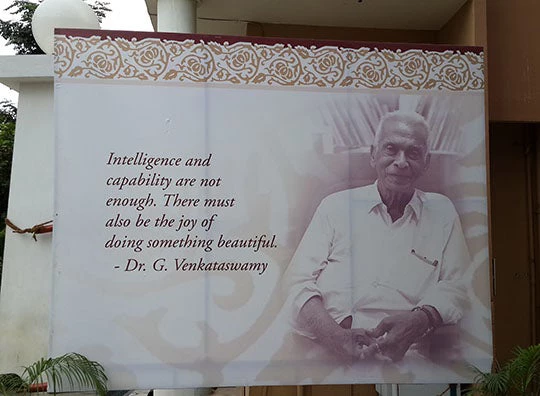“Intelligence and capability are not enough; there must also be the joy of doing something beautiful.” These words by Dr. Venkataswamy tower over us as we enter the flagship Aravind Eye Hospital in Madurai, India, and continue to reflect in the staff’s philosophy during our short visit.
The Aravind Eye Hospital needs no introduction. Tucked in the remote south of India, it is the result of its founder’s vision of eliminating needless blindness. Started in 1976 by Dr. Venkataswamy, the hospital provides accessible, affordable and quality eye care to all sections of the society through cross-subsidization, which creates a commercially viable and sustainable business model.
Aravind Eye Care is an example of a business model innovation, also referred to as an ‘inclusive business model’. IFC defines inclusive business models as those offering goods, services and livelihoods to the poor in financially sustainable and scalable ways. Globally, inclusive businesses are being recognized as important players for development. More entrepreneurs are realizing the bottom of the pyramid (BoP) market as an opportunity to design and implement innovative solutions. As per an IFC study, the BoP represents a potential market of $5 trillion globally - the largest slice of this lies in South Asia, particularly India, given the size of BoP population in the region.
However, inclusive businesses continue to face several barriers in scaling and replicating their success such as lack of access to finance, absence of trained human resources, weak supply chain linkages etc. and above all, an underdeveloped support ecosystem to overcome critical market gaps. Addressing these barriers will not only help capitalize on the growth potential but also mainstream the sector.
World Bank Group is playing a catalytic role in unlocking opportunities for innovative, impact focused businesses. The South Asia Inclusive Business Program has been working towards enhancing private sector participation and inclusive business activity in the region. While working on the high level through systemic interventions, the team is also connecting with organizations on the ground by supporting them to scale sustainably and/or replicate across borders.
Over the last year, we have been working to identify the key gaps facing the ecosystem and find ways to bridge them. In our experience, focus on the following three areas can help de-bottleneck some of the pressing issues and create an enabling infrastructure for inclusive businesses to reach new heights.
Systematic knowledge and information base: One of the key reasons for a relatively weak supportive ecosystem for inclusive businesses is a lack of systematic understanding and a dearth of reliable data. Bridging this information gap can help both the private sector and governments in making investment decisions and forging meaningful partnerships. We recently completed a landscape analysis of the inclusive businesses in health sector. The study, followed by a database, aims to highlight the key opportunities and challenges to enable key stakeholders make more informed decisions.
Standards and Metrics: To mainstream, inclusive business ecosystem needs to evolve to a stage where there are common metrics, standards and terminology to evaluate performance and thus ensure resource allocation to the most efficient ones. Such standards are still under development. For instance, there are a host of impact investors looking to balance social and financial returns and a significant amount of capital waiting at the sidelines for more transparency and clarity. We supported the development of an Impact fund rating tool, PRISM, which aims to help in communicating the impact of a fund in clear and transparent manner and thus help investors allocate capital effectively.
Cross border expansion support: A large number of inclusive businesses are exploring other markets within South Asia and Africa for scaling. There are, however, at present no robust platforms that support businesses to replicate cross border. We are working towards development of a platform and a toolkit for entrepreneurs that will enable an enterprise to test its internal and target market readiness, as well as provide essential market intelligence and linkages.
The sector is fast evolving and at this stage, there is a need for solutions that mobilize, enable and create a marketplace for effective implementation and fast tracking high potential businesses. Inclusive businesses have gained interest from various quarters with several stakeholders and initiatives now focusing in this space. Collaboration, thus, becomes a key to leverage collective knowledge and strengths towards these efforts. Recognizing this, we are working in partnership with other industry players in taking these initiatives to the next level. We will continue updating and sharing our learning in subsequent blog posts, as our work progresses.



Join the Conversation